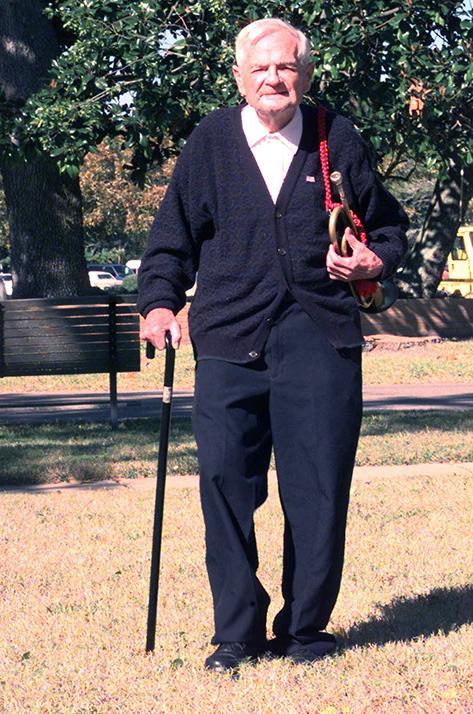
World War I Bugler Still Going Strong and Blowing His Horn
By Rudi Williams - American Forces Press Service
GULFPORT, Miss., Sept. 11, 2000 -- David Spiro is amazing! He will be 102 on Nov. 8. His memory and hearing are slowly ebbing, but he can still muster the lung power to blow his favorite bugle, which he does once in a while just to show he still can.
The World War I Navy bugler is still full of independence. He doesn't have any diseases associated with aging -- no heart condition, diabetes or high blood pressure. The only pills he takes are an aspirin and a water pill. Oh, yes, and he uses eye drops.
"I don't need anybody to help me," the centenarian exclaimed when two nursing assistants offered to take him for a walk on the Naval Home grounds. They disobeyed his wishes and went with him anyway.
Born on Nov. 8, 1898, Spiro was about 14 when he fell in love with bugle playing during Sunday morning services at Grace Presbyterian Church in Brooklyn, N.Y.
"They had a boys' drum and bugle corps and I used to hang out there," said Spiro, who remembers that his mother was a housewife and his father owned a store. He also remembers that the drum major's father was a wealthy man who supplied uniforms and equipment for corps, "especially for his son," he added with a chuckle.
Spiro wasn't in the Navy band, but he used to play the bugle for a variety of functions. The occasion he remembers most was playing for Spanish-American War hero Adm. George Dewey, the victor at Manila, the Philippines.
"I played for Adm. Dewey many times -- nice man," he said repeatedly. He played for presidents, too, including Woodrow Wilson, William Howard Taft and Teddy Roosevelt.
As to his World War I service, Spiro said, "I think I was on a troop ship. That's when they discovered the depth bomb. It's a great thing, the depth charge. We weren't afraid to go anywhere where there were submarines."
Spiro was aboard the troop carrier USS Martha Washington, a former Austrian passenger liner seized by the Army on April 6, 1917, and acquired by the Navy that November. It was commissioned on Jan. 2, 1918. She embarked with a total of 24,005 passengers and after the Armistice returned 19,687 troops and passengers from foreign ports.
"I remember the first time they put me on a battleship -- they put me on watch," Spiro said. "I was an excellent bugler. I knew all the bugle calls, except boat calls."
The centenarian beamed with laughter as he recalled a ship's captain bellowing, "Bugler!"
"Yes, sir!" Spiro answered.
"Call away the second steamer," the captain ordered.
"I don't know that call, sir," Spiro responded. It was Spiro's first time aboard a ship and he hadn't learned all of the boat calls.
"You don't know that call? " the captain asked in surprise. "You're not worth a tinker's damn. You ought to be in the scullery."
But young Spiro was a quick-learner and within a week, he'd memorized the boat calls and could play anything the captain wanted. "It wasn't long before they started calling me to blow the bugle for everybody," Spiro said with a proud chuckle.
He was aboard the battleship USS Kentucky, which served as a training ship in the Chesapeake Bay and along the Atlantic Coast during World War I. She was decommissioned in May 1920 and scrapped in January 1924.
In those days, battleships carried four or five buglers. Spiro said he wasn't "the right size" when he joined the Navy in 1914 at the age of 16, but he was accepted because "I was a damn good bugler. That's the only reason they took me in -- they liked the way I blew the bugle."
The teen-age Spiro weighed 108 pounds, 37 under the Navy's minimum requirement.
"They wanted to throw me out many times because I was too small. I was too young to get in, so I had to lie all the time, especially to my mother," he said. "She hated it, but I got in just the same. I used to sign her name and she never knew I was in the service. I went away and she thought I was on some kind of fancy ship."
Spiro said he "hung on and hung on" until one day he was discharged from the Navy. "Well, this guy, he didn't care much about a bugler anyhow," he said.
Sitting in the Naval Home medical lounge holding his favorite bugle, Spiro said, "I have several bugles, but I like the one that's all banged up. It has been dropped and everything a few times, but I still have my old bugle."
After the war, Spiro got a job with the U.S. Postal Service and spent more than 37 years walking the streets of Brooklyn delivering mail. "Sometimes kids would help me," he said. "They'd climb the stairs if there was nobody looking and put the letters in the slot."
Retiring from the U.S. Postal Service in 1954, he worked odd jobs until 1972. His wife, Mabel, died in 1965 at age 59. Spiro became a resident at the Naval Home in 1972, but ask him how long he's been there and he replies sprightly, "Damned if I know."
Spiro has a daughter, Florence Willard, 65, of Staten Island, N.Y., and a son, Alvin E. Spiro, 74, of Woodhaven, Queens, N.Y. He also has five grandchildren and eight great-grandchildren.
"My daughter, she has been here -- she's my boss," Spiro said. "I don't like it, but, believe it or not, she likes to be my boss." When Willard was told about her father's remarks, she emitted a hearty laugh and said, "He's a typical male. He likes to do things his way, which is fine, as long as he doesn't get into trouble."
Willard remembers that her parents were married on her father's birthday of Nov. 8, but doesn't recall which year. "They'd been married 37 or 38 years when my mother died," she said.
She calls her father once a week, but only talks to him "if he picks up the phone -- he decided he doesn't want to be bothered with the phone," Willard said. "So I'll wait a few days and call the nursing station and tell them to go to his room and tell him I'm going to call him.
"Then he'll pick up the phone and sometimes I'll get a 22-minute conversation about the whole history of when he was a kid," she said. "Other times I'll get a three-minute conversation. If he's depressed, he'll rant and rave."
Willard said it was funny when she and a girlfriend took Spiro to a fancy restaurant in Biloxi, Miss., and "he yelled at the top of his lungs, 'This steak is too tough to chew!"
"When the waiter brought the coffee, he yelled, 'McDonald's has better coffee than you do.' That was really funny, but I don't think the fancy restaurant appreciated. He was 99 years old then."
"He started my career in music by teaching me how to play the bugle when I was 3 years old," said his son Alvin. "I ended up playing trumpet with several organizations, including the North Carolina Symphony."
A petty officer first class during World War II, Alvin Spiro said he played trumpet aboard the aircraft carrier USS Enterprise. He got out of the Navy after about three years to pursue a musical career. Spiro quit the music business in 1950 and pursued a second career in banking.
He said having a 101-year-old father is "amazing." "He's in better physical shape than I am," the younger Spiro said. "When I used to walk with him, he walked faster than me. I have more health problems than he does."
"I've been taking care of David for three and a half years and he doesn't seem like he's aging at all," said Bobby Reed, a certified nurse assistant at the home. "Of course, he has his good days and bad days.
"Good days are fun," Reed said. "That's when he talks about when he was a letter carrier, when he was in the military and how he got into the military. He talks about his wife and the family when the children were growing up and the things they used to do. He even talks about the times when he stopped his wife from disciplining his daughter because she was 'daddy's girl.'"
"The bugle has kept him healthy. Blowing it every day has really kept his lungs strong," the home's executive secretary, Shelda Jones, said. "He used to bring me a banana every day, but he misses a day or two now. He used to blow 'Taps' and 'Reveille' every day, too, but now, only does it once in a while.
"He's so special," she beamed.
- Log in to post comments
